Arts & Entertainment
Arts news in brief: Feb. 10
Scarlet’s Bake Sale, D.C. Front Runners featured in mini doc, Rainbow Families dance and more

Scarlet’s Bake Sale benefit returns
The 41st annual Scarlet’s Foundation Bake Sale is Sunday at the Eagle (639 New York Ave., N.W.) with cake drop-offs from noon to 3 p.m., judging at 3:30 p.m. and the auction beginning at 4 p.m.
Proceeds from the auction will benefit Moveable Feast, an organization based in Baltimore that provides food and other services in order to preserve quality of life for people with HIV/AIDS and other life-threatening conditions, and Pets D.C., which provides public health education, exercise, pet food, veterinary care, grooming, foster care and adoptions services at no cost to individuals living with HIV/AIDS or other disabling conditions and their pets.
There are five categories being judged including Best Individual Entry, Best Commercial Entry, Best Club Entry, Most Creative Entry and the Directors Award.
For more information, call 202-347-6025 or visit dceagle.com.
Morabito at Cobalt; return of Flashback
DJ Susan Morabito is spinning at Cobalt (1639 R St., N.W.) as part of Just Circuit, an event that happens every second Saturday of the month at 10 p.m.
Cobalt is also bringing back its popular Tuesday Flashback retro event next week (Valentine’s Day) with DJs Jason Royce and Erik Lars Evans in the 30 Degrees Lounge area. Rail drinks are two for one and there’s no cover.
Morabito has been playing for audiences for more than 25 years and has released seven CD collections. She has played at events such as the Metropolitan Museum of Art Costume Institutes Benefit Gala, Stonewall Honors, Atlantis Gay Cruise and more.
She has recently been nominated for three Just Circuit Awards including Best DJ/Producer, Best DJ Podcast and Best DJ — Hall of Fame.
There is a $10 cover for this event. For more information, visit cobaltdc.com or Morabito’s official website, susanmorabito.com.
Gay running group featured in local doc
The Our City Film Festival, started by Yachad, a D.C. non-profit committed to affordable housing and community development, is Saturday and Sunday.
The festival begins with an opening night party featuring Christylez Bacon, a Grammy-nominated artists, Party Girl, a Costello cover band and Edge Theory, a progressive jazz band at the Sixth and I Synagogue (600 I St., N.W.) at 8 p.m. Entry is free with a film ticket or $8 without.
Starting Sunday at 10:30 a.m. at the Goethe Institute (812 7th St., N.W.) the various films will be screened in groupings based on topic. At 12:45 p.m., the grouping, “Our Body” will feature a 13-minute documentary by Brian Beary and Marcel Acosta called “Fast Forward,” which provides a glimpse into the struggles and successes of founding D.C.’s now thriving gay and lesbian running club, The Front Runners.
Tickets are $10 for each film grouping and can be purchased online.
For more information on the festival, including a full schedule of films, visitourcityfilmfestival.com.
Gay art collective hosts monthly performance show
Hillyer Art Space (9 Hillyer Court, N.W.) is teaming up with local gay arts collective Boys Be Good for this month’s Soapbox, a monthly performance art showcase increasing exposure to this art form, on Thursday from 7 to 9 p.m.
The show will include performances by Armando Lopez Bircann, whose performance uses shadows and light; Andrew Fogle, whose poetic work stumbles into themes of lack, trauma, dislocation and more; Devon Hopkins, a Wesleyan grad, who works in social psychology, group dynamics and the intersection of social networking with post-modern choreography; and Jason Edward Tucker, who focuses on challenging the gaze through a concealment and confounding of gender and constructed identity.
There is a $5 suggested donation at the door.
For more information and a sample of past performances, visitartsandartists.org/hillier/
Rainbow Families hosting kid-friendly dance
Rainbow Families is having its Mid-Winter Family Dance on Saturday at the Washington Ethical Society (7750 16th St., N.W.) from 6:30 to 9 p.m.
The event will feature a family friendly DJ, dance games and activities. There will also be pizza, beverages and dessert.
This event is ideal for children ages 4 and over. A quiet room will be provided for younger children and their parents.
Registration is $10 for adult members and $13 for non-members. Registration for all children 5 and older is $5 and children 4 and younger can be registered for free.
For more information and to register for the dance or join Rainbow Families, visit rainbowfamiliesdc.org.

The 44th annual Queen of Hearts pageant was held at The Lodge in Boonsboro, Md. on Friday, Feb. 20. Six contestants vied for the title and Bev was crowned the winner.
(Washington Blade photos by Michael Key)
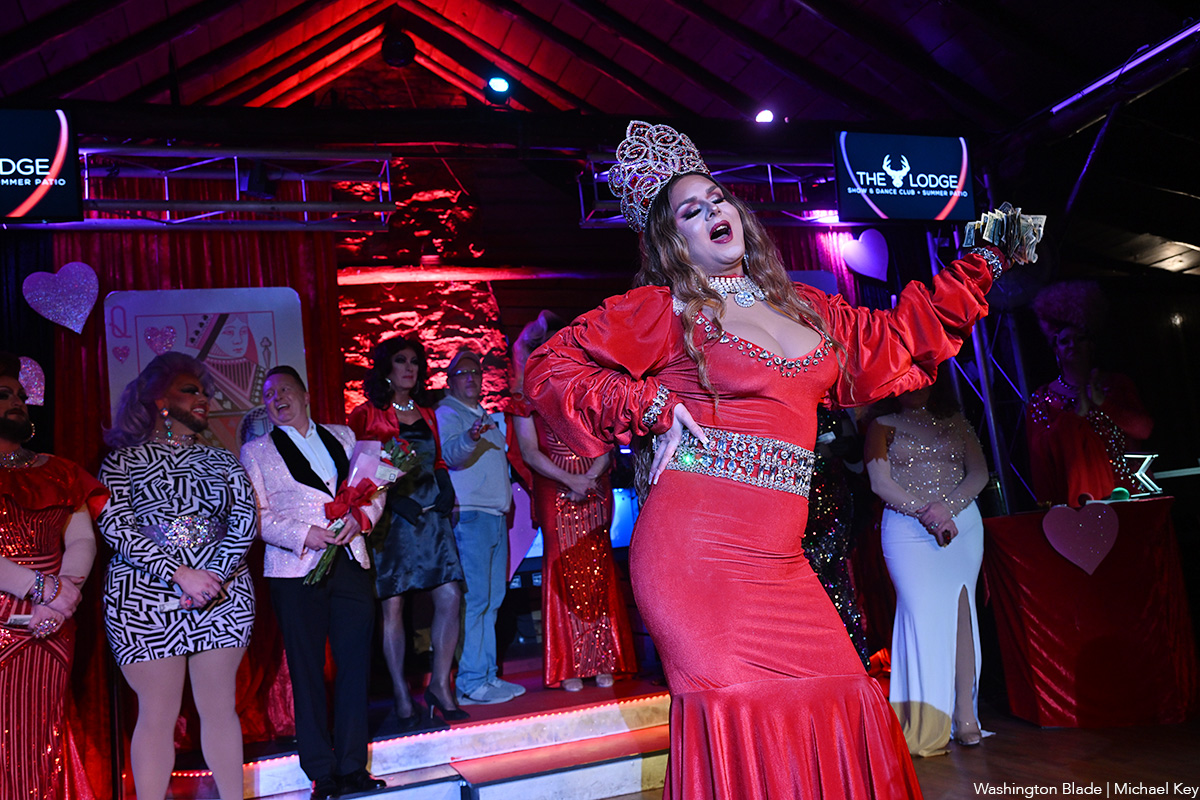
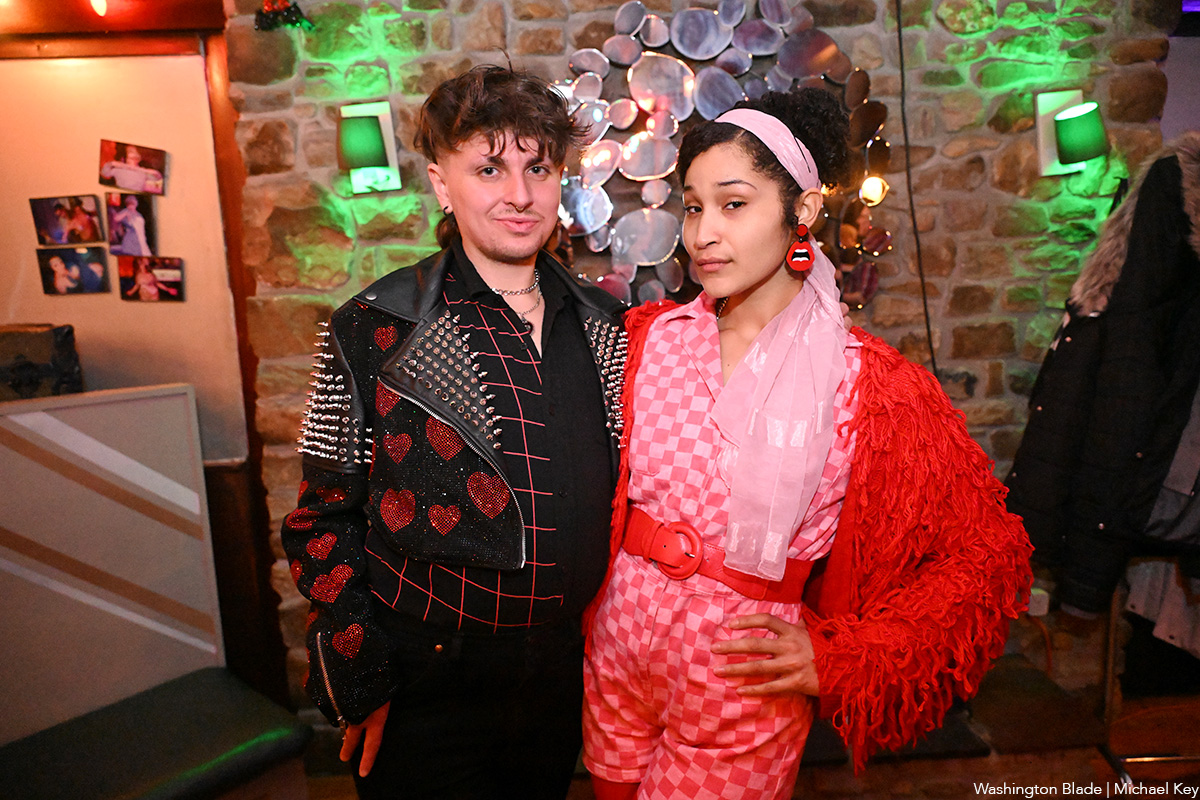
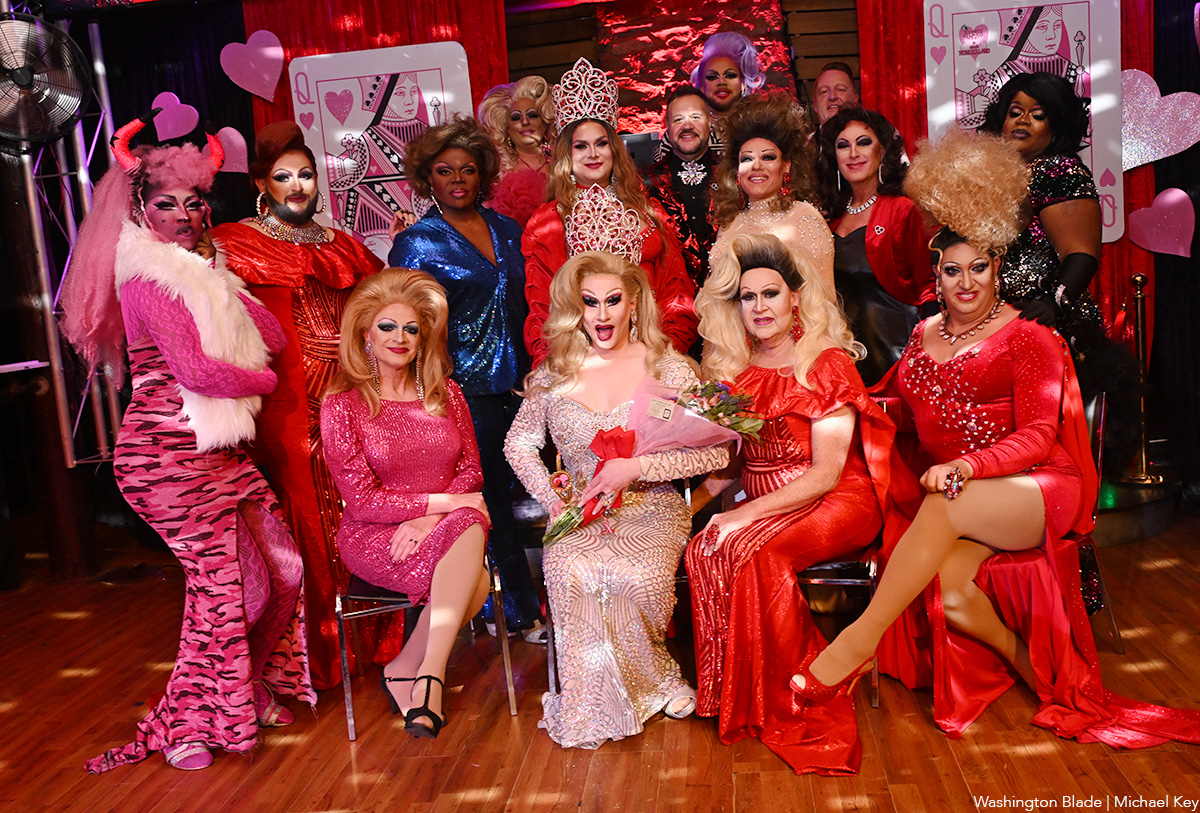
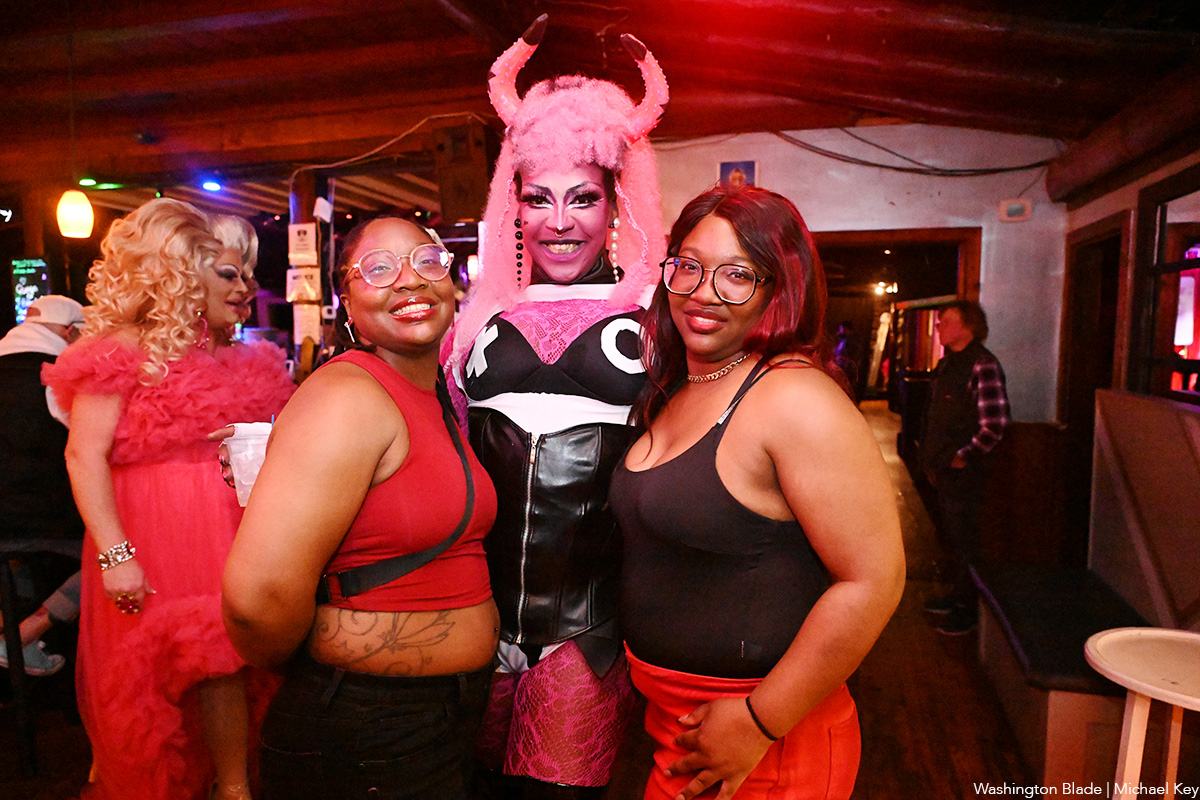
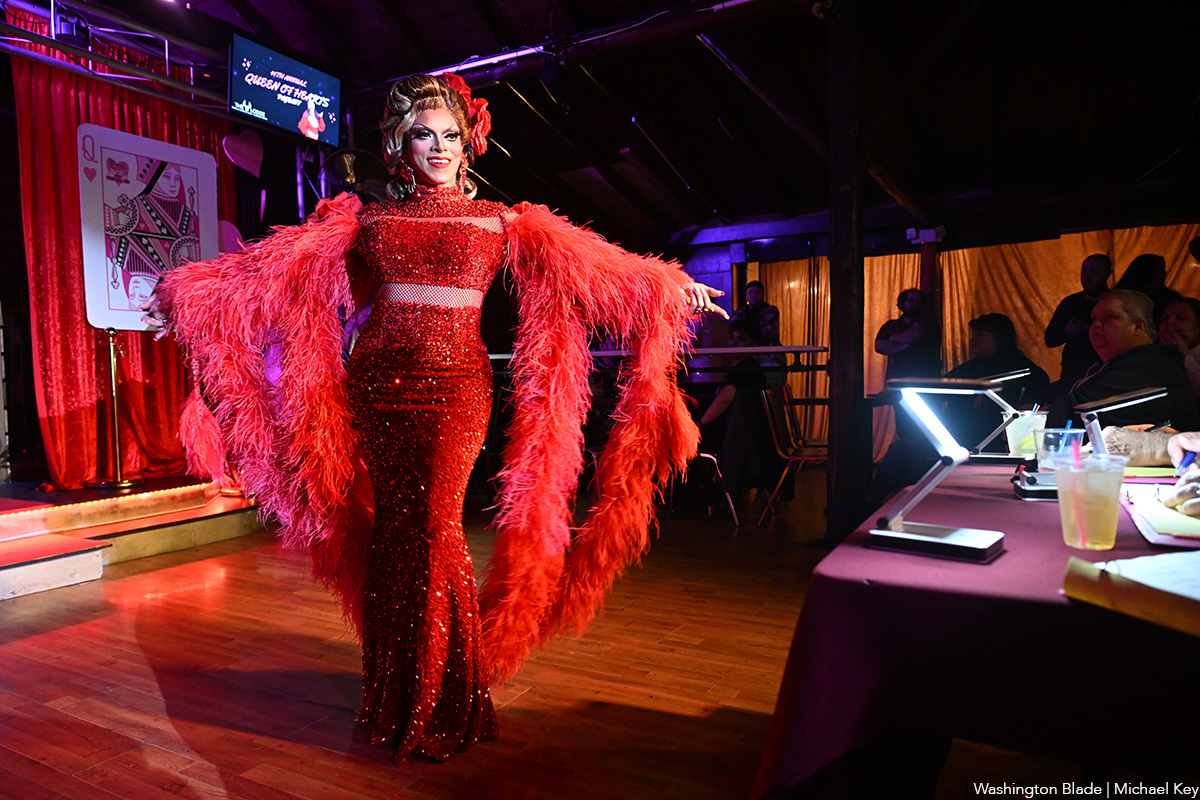
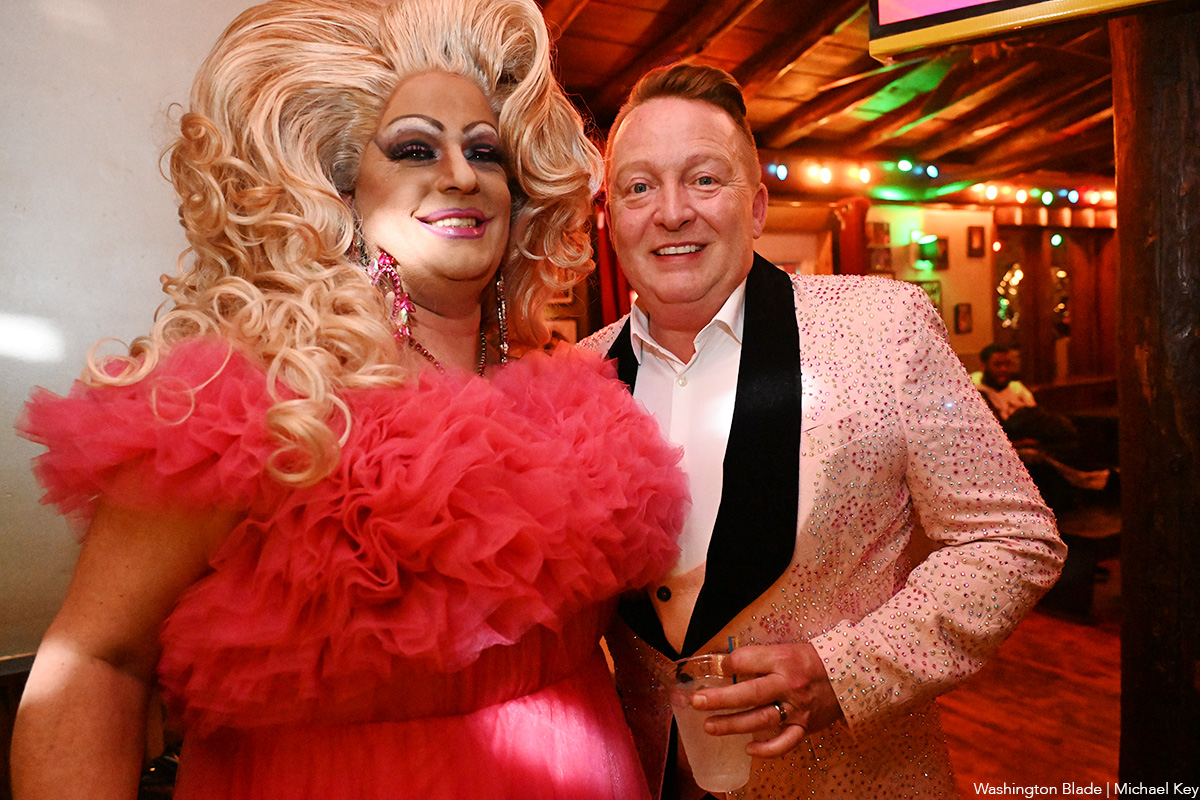
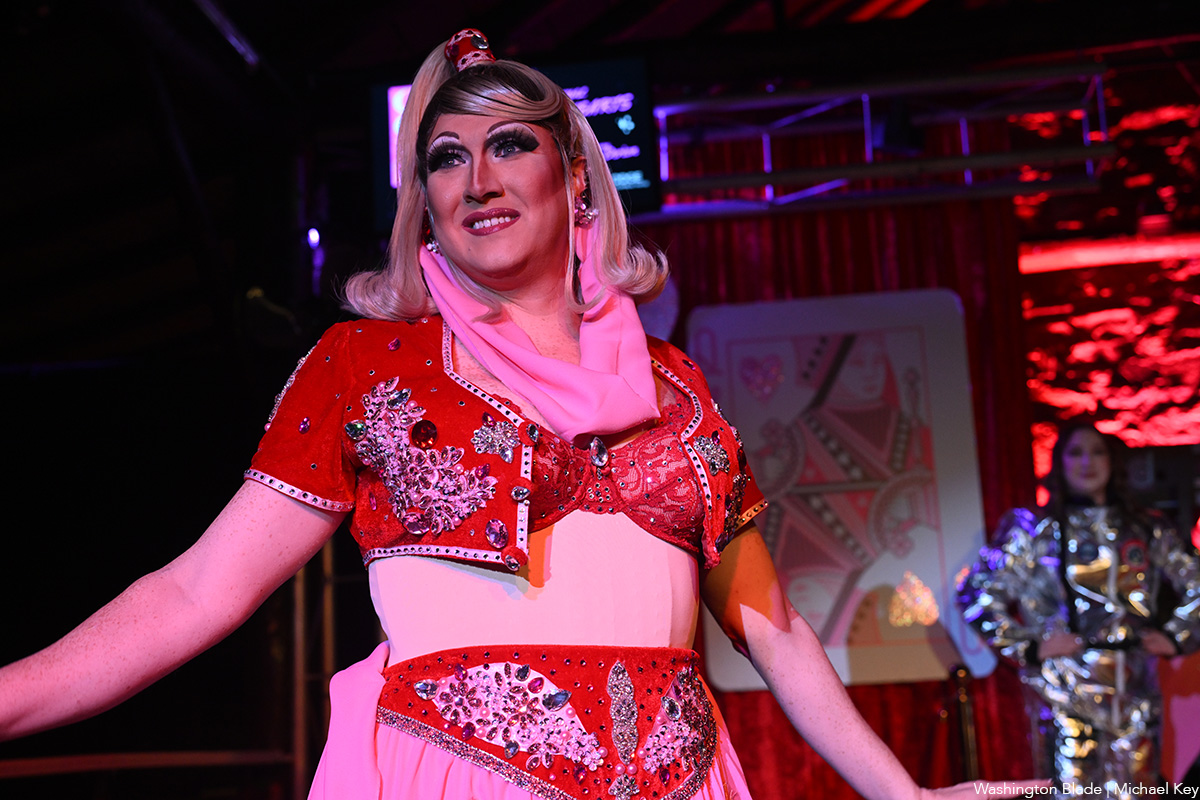

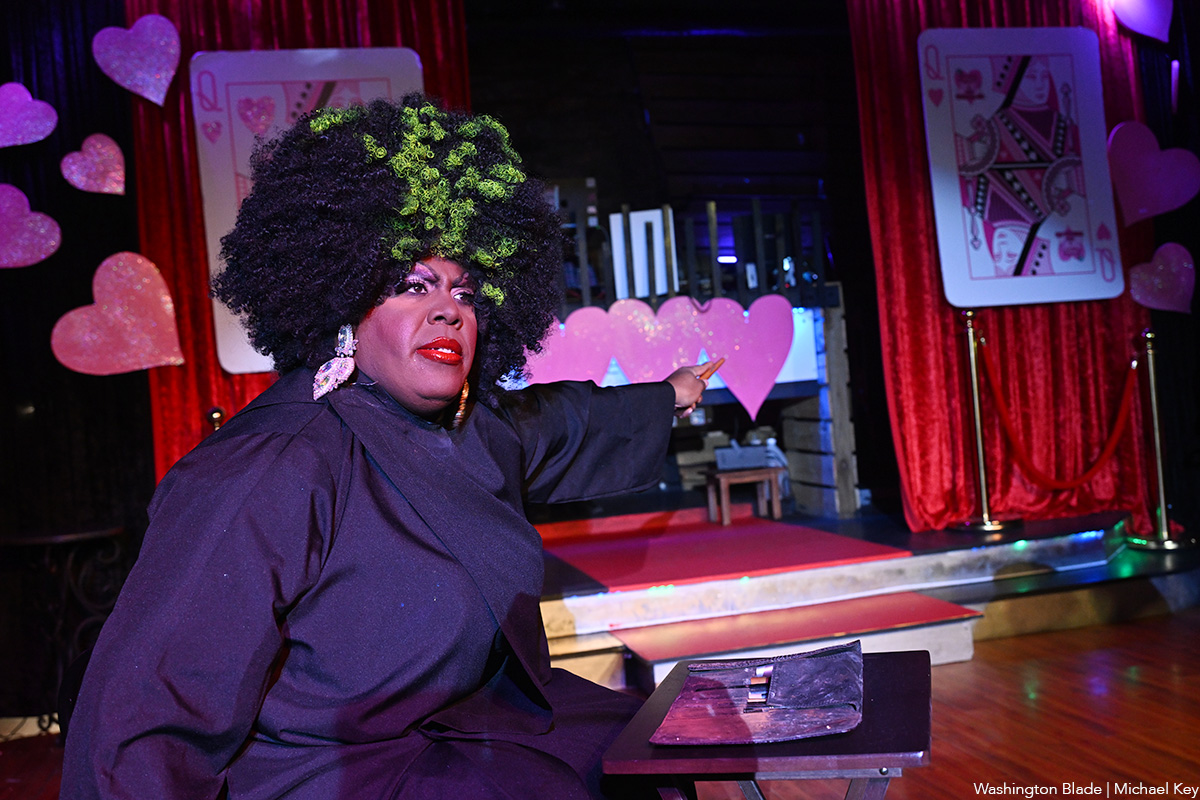
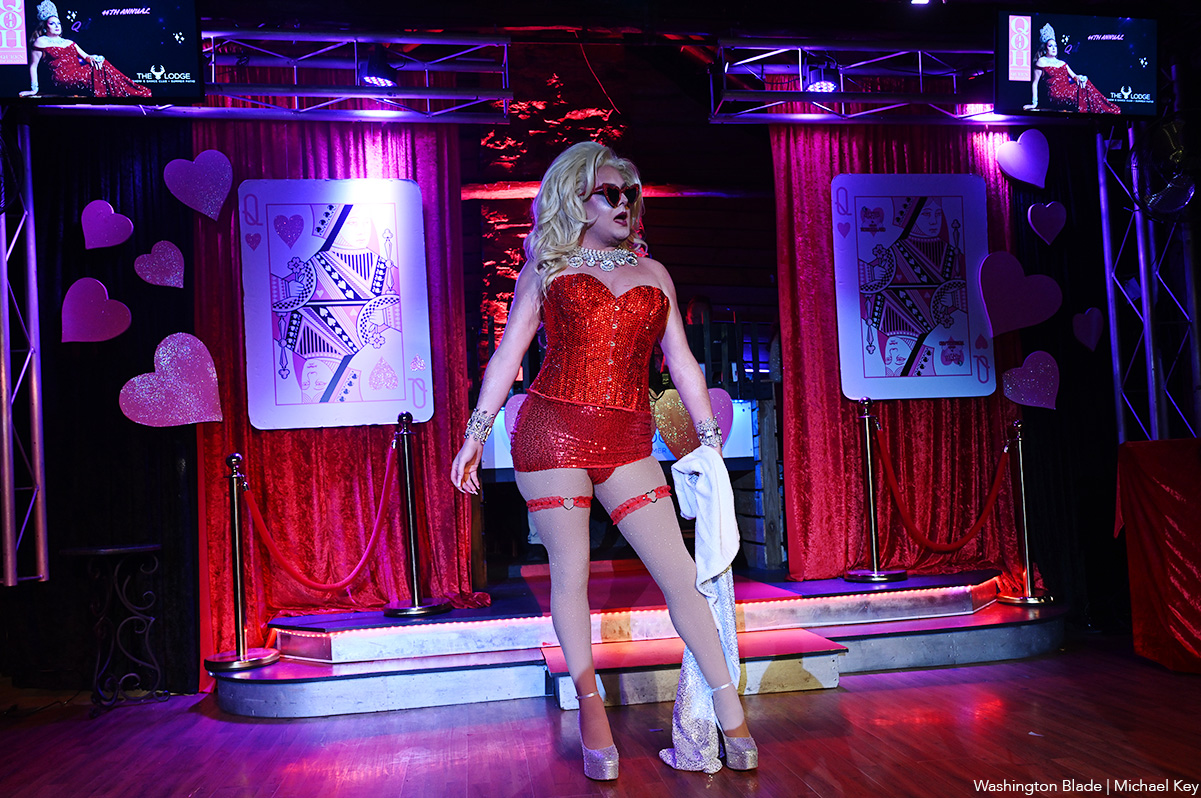
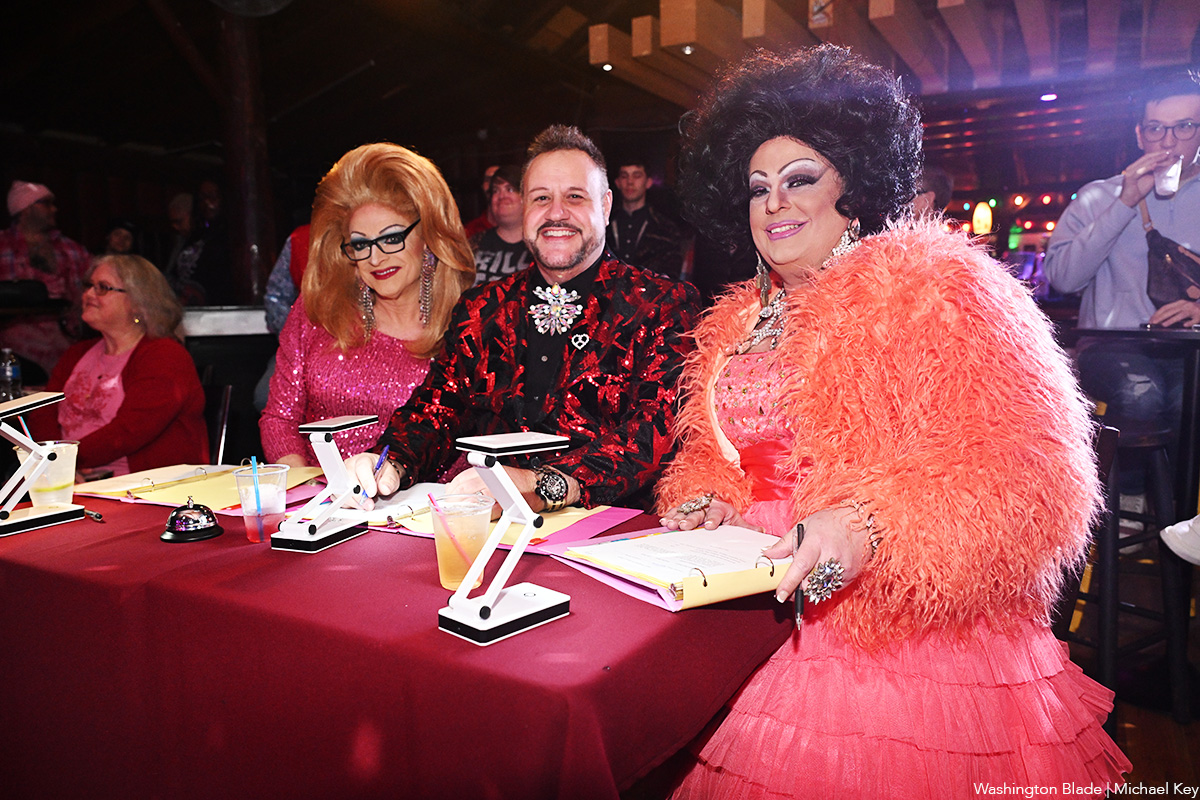
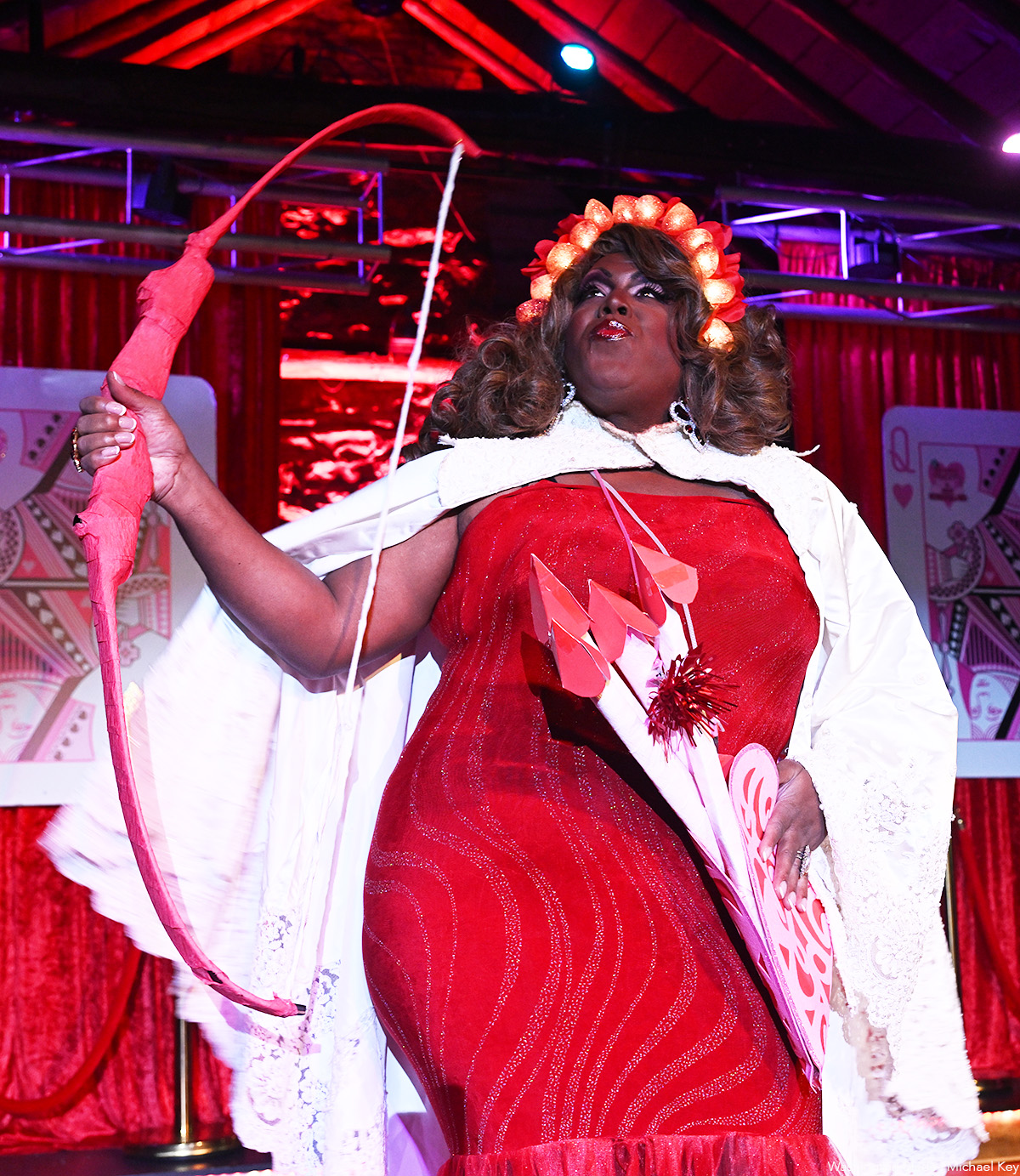
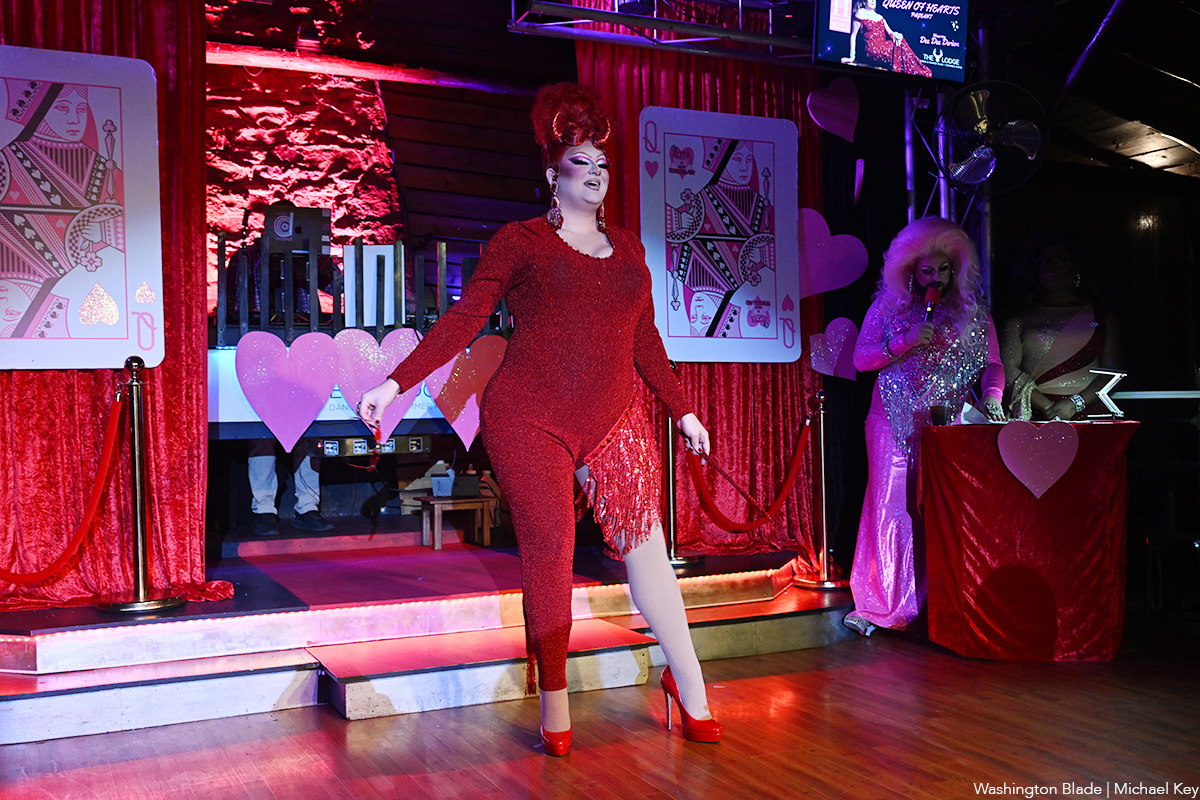


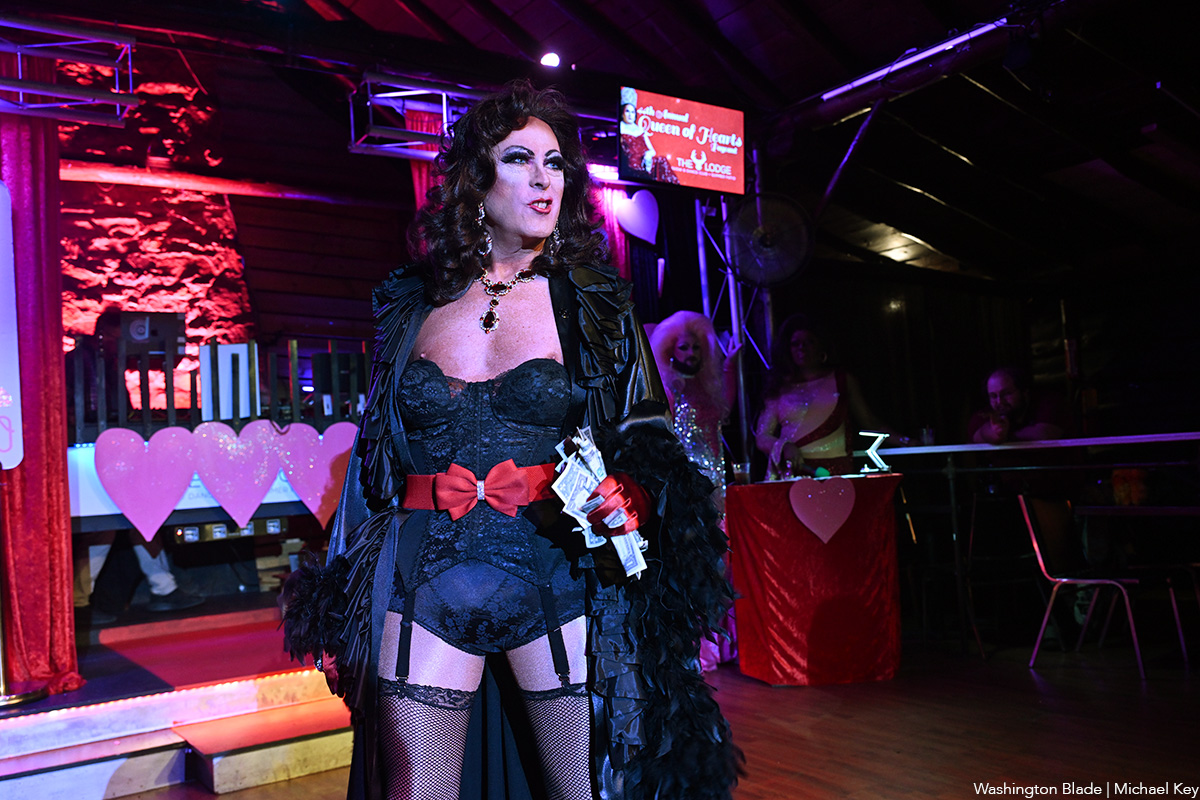
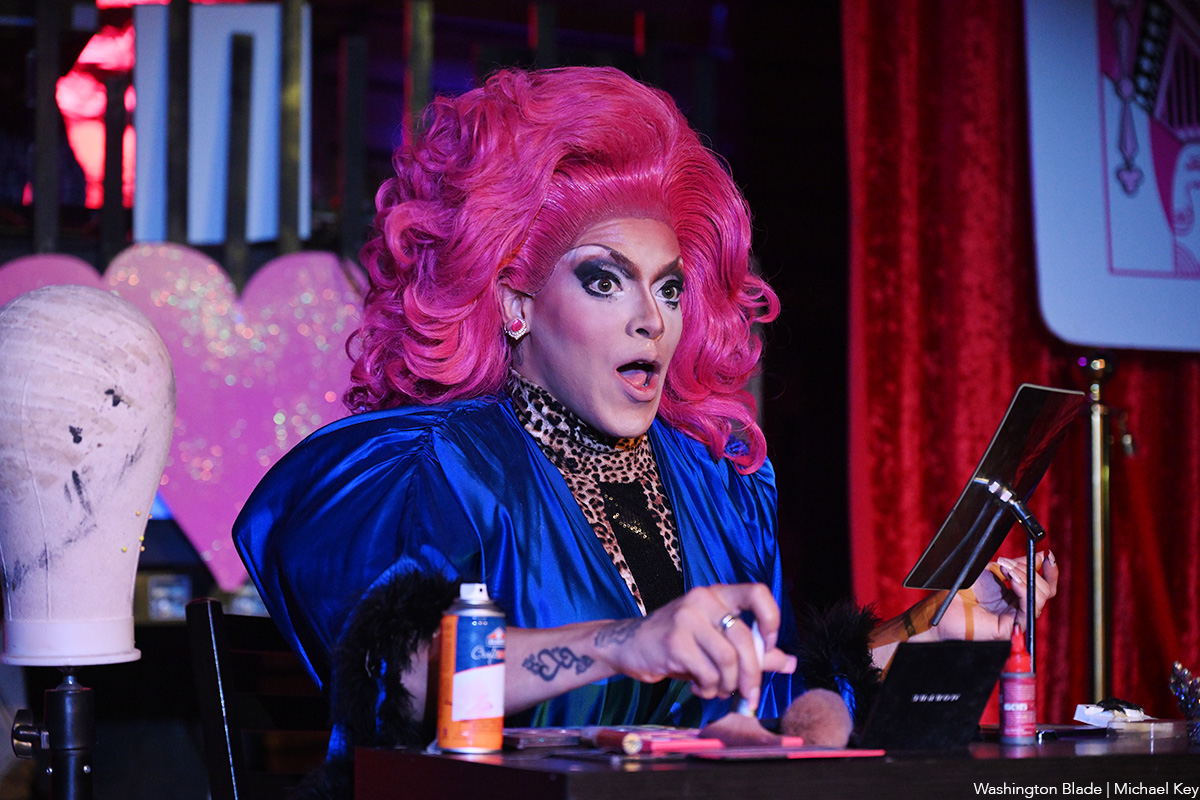



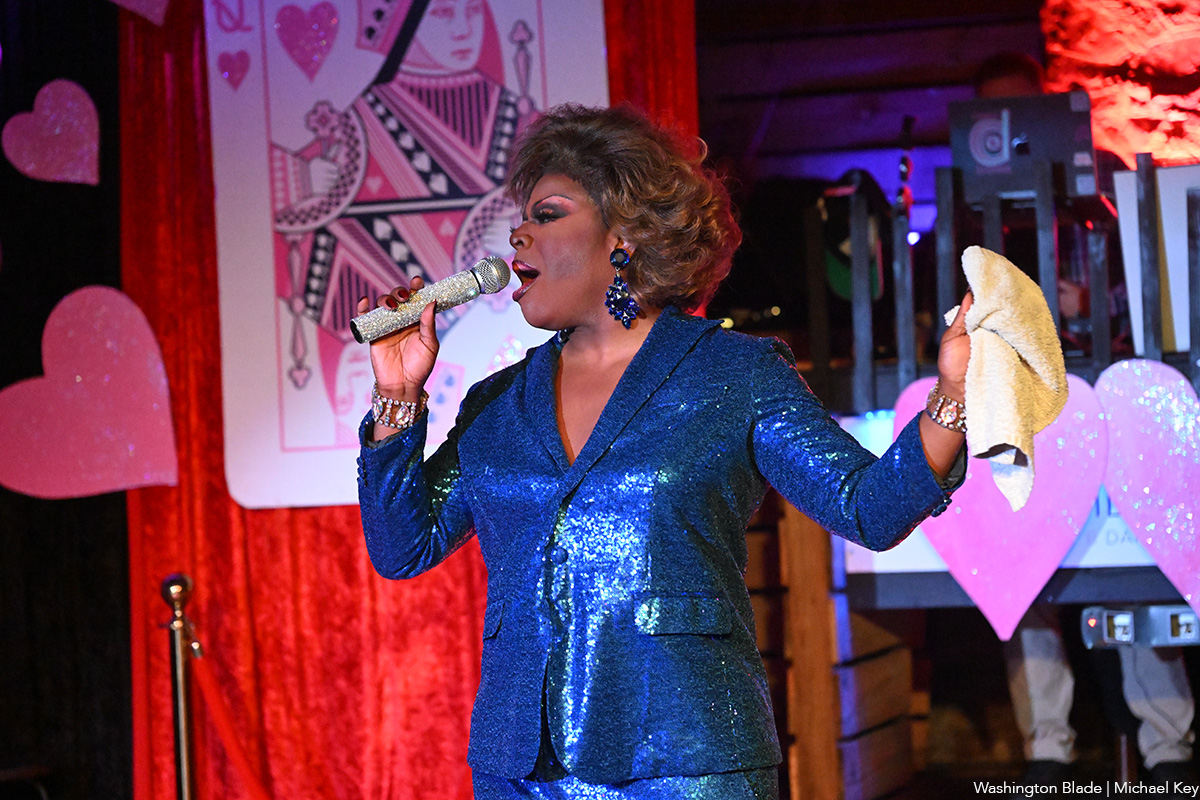

View on Threads
Books
New book profiles LGBTQ Ukrainians, documents war experiences
Tuesday marks four years since Russia attacked Ukraine

Journalist J. Lester Feder’s new book profiles LGBTQ Ukrainians and their experiences during Russia’s war against their country.
Feder for “The Queer Face of War: Portraits and Stories from Ukraine” interviewed and photographed LGBTQ Ukrainians in Kyiv, the country’s capital, and in other cities. They include Olena Hloba, the co-founder of Tergo, a support group for parents and friends of LGBTQ Ukrainians, who fled her home in the Kyiv suburb of Bucha shortly after Russia launched its war on Feb. 24, 2022.
Russian soldiers killed civilians as they withdrew from Bucha. Videos and photographs that emerged from the Kyiv suburb showed dead bodies with their hands tied behind their back and other signs of torture.

Olena Shevchenko, chair of Insight, a Ukrainian LGBTQ rights group, wrote the book’s forward.

The book also profiles Viktor Pylypenko, a gay man who the Ukrainian military assigned to the 72nd Mechanized Black Cossack Brigade after the war began. Feder writes Pylypenko’s unit “was deployed to some of the fiercest and most important battles of the war.”
“The brigade was pivotal to beating Russian forces back from Kyiv in their initial attempt to take the capital, helping them liberate territory near Kharkiv and defending the front lines in Donbas,” wrote Feder.
Pylypenko spent two years fighting “on Ukraine’s most dangerous battlefields, serving primarily as a medic.”
“At times he felt he was living in a horror movie, watching tank shells tear his fellow soldiers apart before his eyes,” wrote Feder. “He held many men as they took their final breaths. Of the roughly one hundred who entered the unit with him, only six remained when he was discharged in 2024. He didn’t leave by choice: he went home to take care of his father, who had suffered a stroke.”
Feder notes one of Pylypenko’s former commanders attacked him online when he came out. Pylypenko said another commander defended him.
Feder also profiled Diana and Oleksii Polukhin, two residents of Kherson, a port city in southern Ukraine that is near the mouth of the Dnieper River.
Ukrainian forces regained control of Kherson in November 2022, nine months after Russia occupied it.
Diana, a cigarette vender, and Polukhin told Feder that Russian forces demanded they disclose the names of other LGBTQ Ukrainians in Kherson. Russian forces also tortured Diana and Polukhin while in their custody.
Polukhim is the first LGBTQ victim of Russian persecution to report their case to Ukrainian prosecutors.

Feder, who is of Ukrainian descent, first visited Ukraine in 2013 when he wrote for BuzzFeed.
He was Outright International’s Senior Fellow for Emergency Research from 2021-2023. Feder last traveled to Ukraine in December 2024.
Feder spoke about his book at Politics and Prose at the Wharf in Southwest D.C. on Feb. 6. The Washington Blade spoke with Feder on Feb. 20.
Feder told the Blade he began to work on the book when he was at Outright International and working with humanitarian groups on how to better serve LGBTQ Ukrainians. Feder said military service requirements, a lack of access to hormone therapy and documents that accurately reflect a person’s gender identity and LGBTQ-friendly shelters are among the myriad challenges that LGBTQ Ukrainians have faced since the war began.
“All of these were components of a queer experience of war that was not well documented, and we had never seen in one place, especially with photos,” he told the Blade. “I felt really called to do that, not only because of what was happening in Ukraine, but also as a way to bring to the surface issues that we’d had seen in Iraq and Syria and Afghanistan.”

Feder also spoke with the Blade about the war’s geopolitical implications.
Russian President Vladimir Putin in 2013 signed a law that bans the “promotion of homosexuality” to minors.
The 2014 Winter Olympics took place in Sochi, a Russian resort city on the Black Sea. Russia annexed Crimea from Ukraine a few weeks after the games ended.
Russia’s anti-LGBTQ crackdown has continued over the last decade.
The Russian Supreme Court in 2023 ruled the “international LGBT movement” is an extremist organization and banned it. The Russian Justice Ministry last month designated ILGA World, a global LGBTQ and intersex rights group, as an “undesirable” organization.
Ukraine, meanwhile, has sought to align itself with Europe.
Ukrainian President Volodymyr Zelenskyy after a 2021 meeting with then-President Joe Biden at the White House said his country would continue to fight discrimination based on sexual orientation and gender identity. (Zelenskyy’s relationship with the U.S. has grown more tense since the Trump-Vance administration took office.) Zelenskyy in 2022 publicly backed civil partnerships for same-sex couples.
Then-Ukrainian Ambassador to the U.S. Oksana Markarova in 2023 applauded Kyiv Pride and other LGBTQ and intersex rights groups in her country when she spoke at a photo exhibit at Ukraine House in D.C. that highlighted LGBTQ and intersex soldiers. Then-Kyiv Pride Executive Director Lenny Emson, who Feder profiles in his book, was among those who attended the event.
“Thank you for everything you do in Kyiv, and thank you for everything that you do in order to fight the discrimination that still is somewhere in Ukraine,” said Markarova. “Not everything is perfect yet, but you know, I think we are moving in the right direction. And we together will not only fight the external enemy, but also will see equality.”
Feder in response to the Blade’s question about why he decided to write his book said he “didn’t feel” the “significance of Russia’s war against Ukraine” for LGBTQ people around the world “was fully understood.”
“This was an opportunity to tell that big story,” he said.
“The crackdown on LGBT rights inside Russia was essentially a laboratory for a strategy of attacking democratic values by attacking queer rights and it was one as Ukraine was getting closet to Europe back in 2013, 2014,” he added. “It was a strategy they were using as part of their foreign policy, and it was one they were using not only in Ukraine over the past decade, but around the world.”
Feder said Republicans are using “that same strategy to attack queer people, to attack democracy itself.”
“I felt like it was important that Americans understand that history,” he said.

More than a dozen LGBTQ athletes won medals at the Milan Cortina Winter Olympics that ended on Sunday.
Cayla Barnes, Hilary Knight, and Alex Carpenter are LGBTQ members of the U.S. women’s hockey team that won a gold medal after they defeated Canada in overtime. Knight the day before the Feb. 19 match proposed to her girlfriend, Brittany Bowe, an Olympic speed skater.
French ice dancer Guillaume Cizeron, who is gay, and his partner Laurence Fournier Beaudry won gold. American alpine skier Breezy Johnson, who is bisexual, won gold in the women’s downhill. Amber Glenn, who identifies as bisexual and pansexual, was part of the American figure skating team that won gold in the team event.
Swiss freestyle skier Mathilde Gremaud, who is in a relationship with Vali Höll, an Austrian mountain biker, won gold in women’s freeski slopestyle.
Bruce Mouat, who is the captain of the British curling team that won a silver medal, is gay. Six members of the Canadian women’s hockey team — Emily Clark, Erin Ambrose, Emerance Maschmeyer, Brianne Jenner, Laura Stacey, and Marie-Philip Poulin — that won silver are LGBTQ.
Swedish freestyle skier Sandra Naeslund, who is a lesbian, won a bronze medal in ski cross.
Belgian speed skater Tineke den Dulk, who is bisexual, was part of her country’s mixed 2000-meter relay that won bronze. Canadian ice dancer Paul Poirier, who is gay, and his partner, Piper Gilles, won bronze.
Laura Zimmermann, who is queer, is a member of the Swiss women’s hockey team that won bronze when they defeated Sweden.
Outsports.com notes all of the LGBTQ Olympians who competed at the games and who medaled.





















